David Uzochukwu (born 1998) is an Austrian-Nigerian self-taught visual artist, who first delved into self-portraiture in his teenage years. His practice now looks more broadly at notions of strength, masculinity, resilience and belonging, expressed through digitally reconfigured landscapes and the idea of the surreal.
Uzochukwu’s works have been exhibited at BOZAR (Brussels), Lagos Photo Festival (Nigeria) and Photo Vogue Festival (Italy). In 2017, he collaborated with FKA twigs on the creative campaign “do you believe in more?” for Nike; and later with Pharrell Williams and Louis XIII Cognac on the visual art for their collaborative song (which won’t be released until 2117). We’re only 6 weeks into 2021, and Uzochukwu has already premiered his short film GÖTTERDÄMMERUNG at film-festival Max-Ophüls-Preis (Germany), while also pursuing his first degree in philosophy in Berlin. It’s no wonder the British Journal of Photography recently named him as one to watch.
Autograph’s Bindi Vora recently had the pleasure of meeting Uzochukwu at a portfolio review and seeing his work. As part of her series of interviews with emerging artists, Vora sat down with Uzochukwu once more to speak at length about some of the ideas behind his series Mare Monstrum / Drown In My Magic.
Bindi Vora: I first saw your work at the recent Futures Photography portfolio reviews in autumn 2020, and I was intrigued by the surreal dreamlike visuals you’ve created in your ongoing series Mare Monstrum / Drown In My Magic. Picking up our conversation, I’d like to speak more about the landscapes in the images. Your work has a distinct relationship between the ocean and the body, referencing utopian ideals of boundlessness and transcendence. Why is this landscape important?
David Uzochukwu: In my images, I like to think of the landscape as an extension of the body. Or perhaps (not to be so anthropocentric) think of the body as part of the landscape, nature’s means to witnessing itself. I consider the emotions that an environment could evoke in us as humans - warm skies expressing joy, fog evoking shelter or isolation - and use these ideas to try to link with what the protagonist in my photographs is supposed to be feeling.
This is relevant because my work is very much staged and constructed, whether it means that someone performs outside, or if their environment is added in digital post-production.
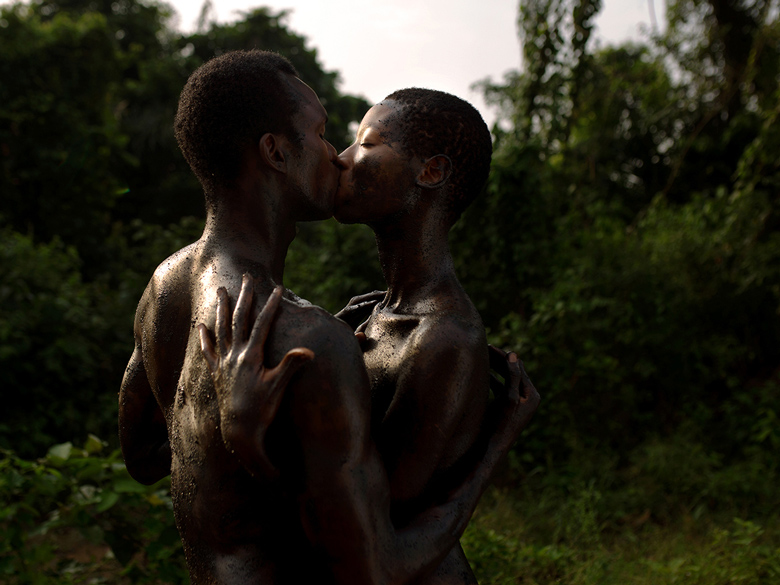 One, from Pluton, 2019
One, from Pluton, 2019.-self-portrait%2C-2015.jpg) A Familiar Ruin (Traffic), self portrait, 2015
A Familiar Ruin (Traffic), self portrait, 2015Bindi Vora: You present many symbolic elements in the composition of your photographs, often surreal, fantastical and otherworldly. One of the ‘Black mermaid’ characters in the Mare Monstrum / Drown In My Magic photographs, for example, features glistening scales adorning the body, and hands that have morphed into far reaching limbs. You draw inspiration from mythological lore, but there is a deeper meaning, what do these signs reflect?
David Uzochukwu: I definitely love fantasy. Parallel worlds offered me new perspectives throughout my childhood, and I needed respite from social dynamics regularly. Growing up I craved safety and welcomed a hiding place in the form of another world in which I could forget about seemingly unsolvable real-life conflicts. I could escape into spaces full of beauty, live in stories where I could be powerful. That echoed back into my life - it literally shaped my dreams.
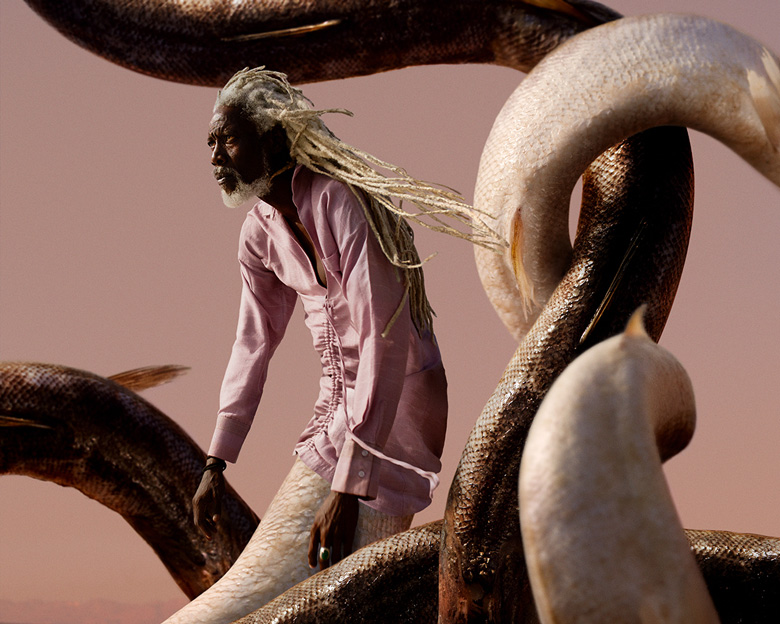 Rising, from Mare Monstrum / Drown In My Magic, 2019
Rising, from Mare Monstrum / Drown In My Magic, 2019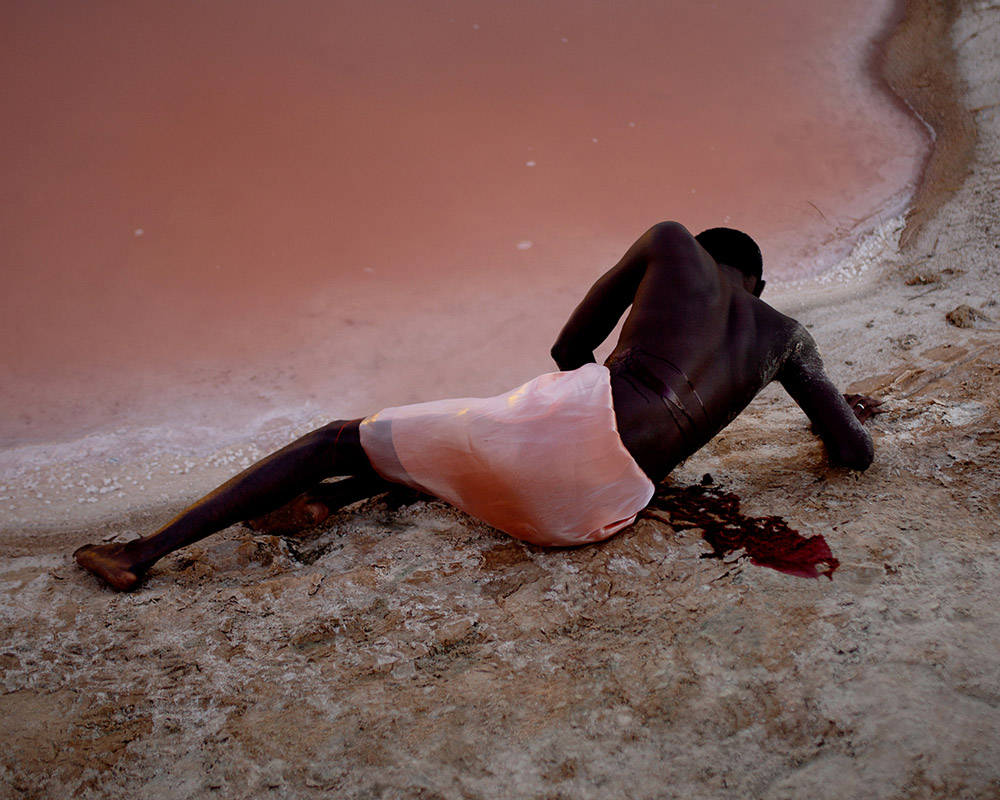 Slab, from Mare Monstrum / Drown In My Magic, 2019
Slab, from Mare Monstrum / Drown In My Magic, 2019I made part of Mare Monstrum / Drown In My Magic in a Senegalese coastal town, in which people regularly disappear into the ocean trying to reach the Canary Islands and then Europe. On some level, the brutality of those waves and currents reflects some of the violence we’ve witnessed over the last decade as people came looking for shelter on European shores. I wanted to, instead, envision the water as an expanse in which the characters in my photographs could cut through, master and be safe in. I wanted them to be in control, to be equipped to survive. No longer were they subject to the whims of the tide, having to drift into a void that holds the potential for destruction.
These images sit somewhere between an expression of Black futures and fantasies. I'm interested in aspects of vulnerability, autonomy, futures, fantasy, excellence; and what happens when these ideas come together in a photograph. When I think about the potential of self-actualization lapping at someone’s feet, it calls to mind those that have come before them, the blood, sweat and tears of those individuals.
If I think about the critical questions surrounding the concept of race, I have found Blackness as a construction has been violently created to contrast whiteness. I want to decentre this logic through the images I make.
Bindi Vora: The human body is central to your work, where strength, resilience and fragility come together in the frame. I was intrigued by images such as Shoulder (2019) in which these figures contort to lean on one another, almost speaking to an impermeability. These compositions reference wider questions around masculinity. Why are these ideas important to you?
David Uzochukwu: All bodies carry strength and vulnerability in them, and to represent that feels very satisfying to me. It brings me closer to how multifaceted people and their inner forces are, and allows for these different traits to coexist, maybe even to take root in each other. Interpreting emotional vulnerability as strength undoes the traditions of masculine behaviour patterns - that I’m personally thrilled to let go of. Addressing this in my work, even implicitly, helps me rewire my synapses and to question how I want to relate to the people around me. When it comes to the notion of gender, I’m only really interested in breaking it.
Layering different images in my photographs always makes me feel like I am building one large being. It fascinates me to entwine the figures until they line up and complete each other, letting each individual become an essential part of something exceeding them.
Bindi Vora: In some ways it’s in the surreal that your images come to life. On the surface, they are phantasmic: they feel like they exist beyond our imagination, in a parallel time, a duality. The existence of these hybrid bodies contemplates multiple entities, times, forms, shapes all coalescing together. Delving deeper, these constructs are drawn from historical and cultural memory. What does the idea of surrealism mean for you?
David Uzochukwu: ‘Coalescence’ fits! Singular components that are already recognisable tumble together, shaping something that feels new. There is a form of surrealism in strange occurrences - thin clouds catching the sun and turn so blinding I can barely walk down the street or hearing the song I’ve been listening to in the whirring of the airplane motor. I keep a diary of these moments, in which the creativity of the world surrounding me seems to issue a challenge.
Violent memories and realities are deeply entrenched in the essence of Black history. Rooting my visual exploration of these issues in a recognisable social context, it didn’t interest me as much. I wanted to remove the characters in my work from historically oppressive, manmade environments and think about their future in refreshingly unmarked surroundings. A parallel existence, speaking to every person’s inherent worth, in independence. The aspect of timelessness always fascinates me when I work. It definitely stems from being hungry for this visual respite from the everyday, but hopefully it makes the images relatable.
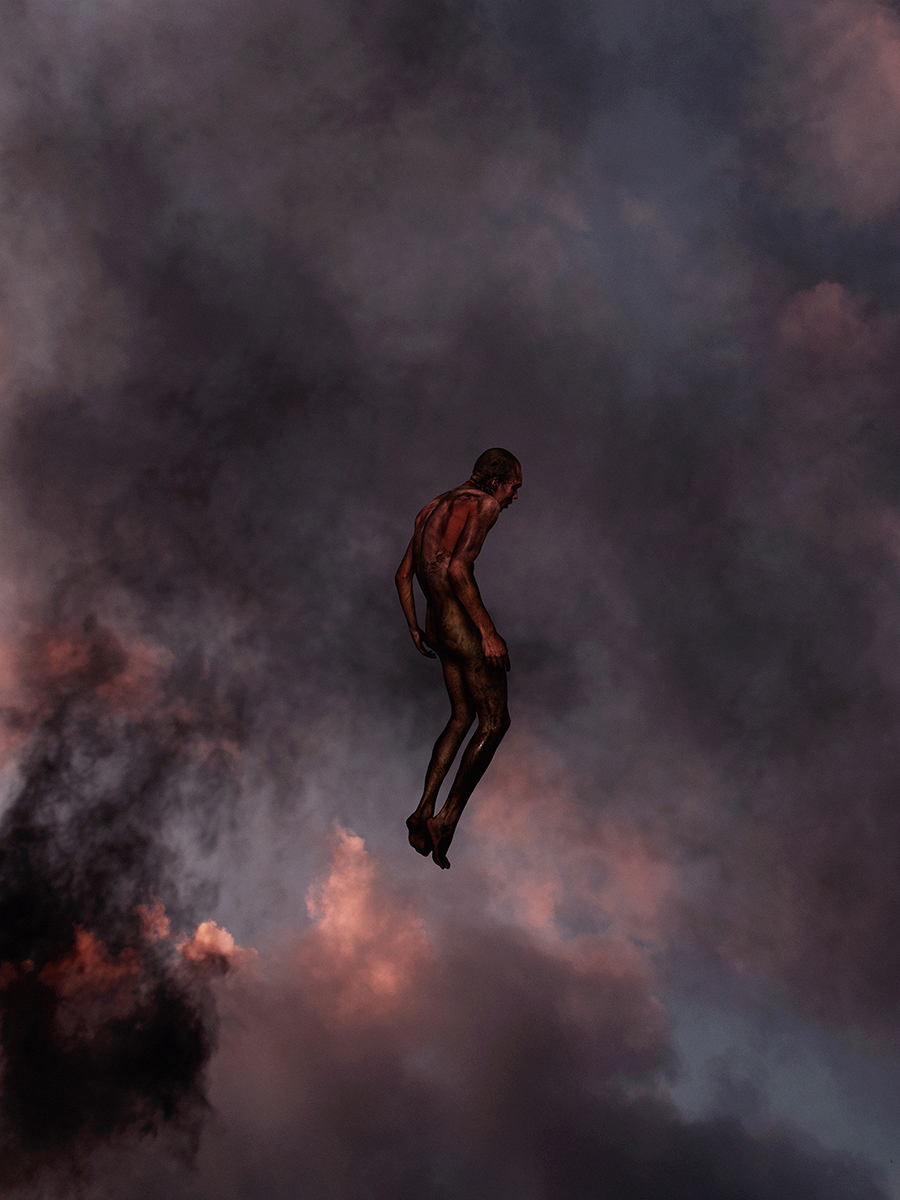 A hollow burn, self portrait, 2020
A hollow burn, self portrait, 2020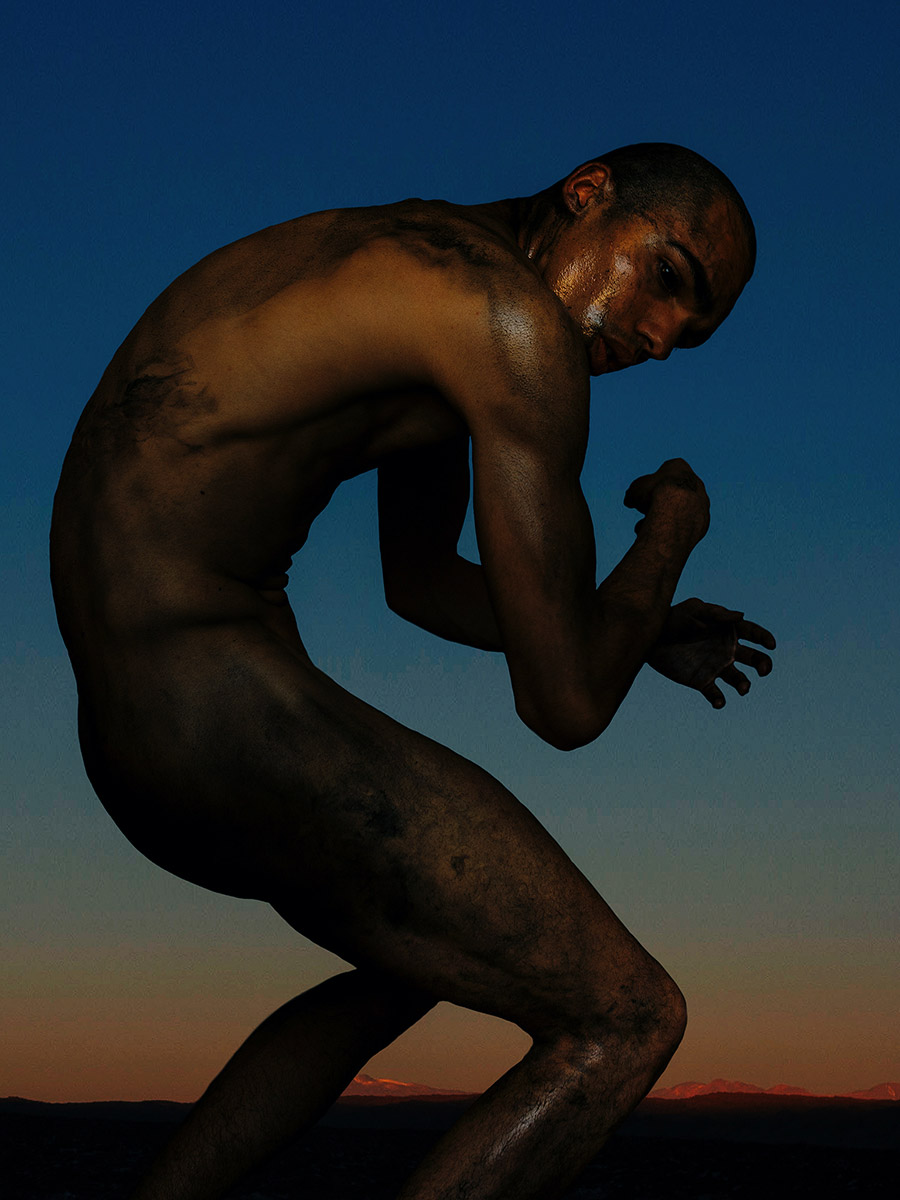
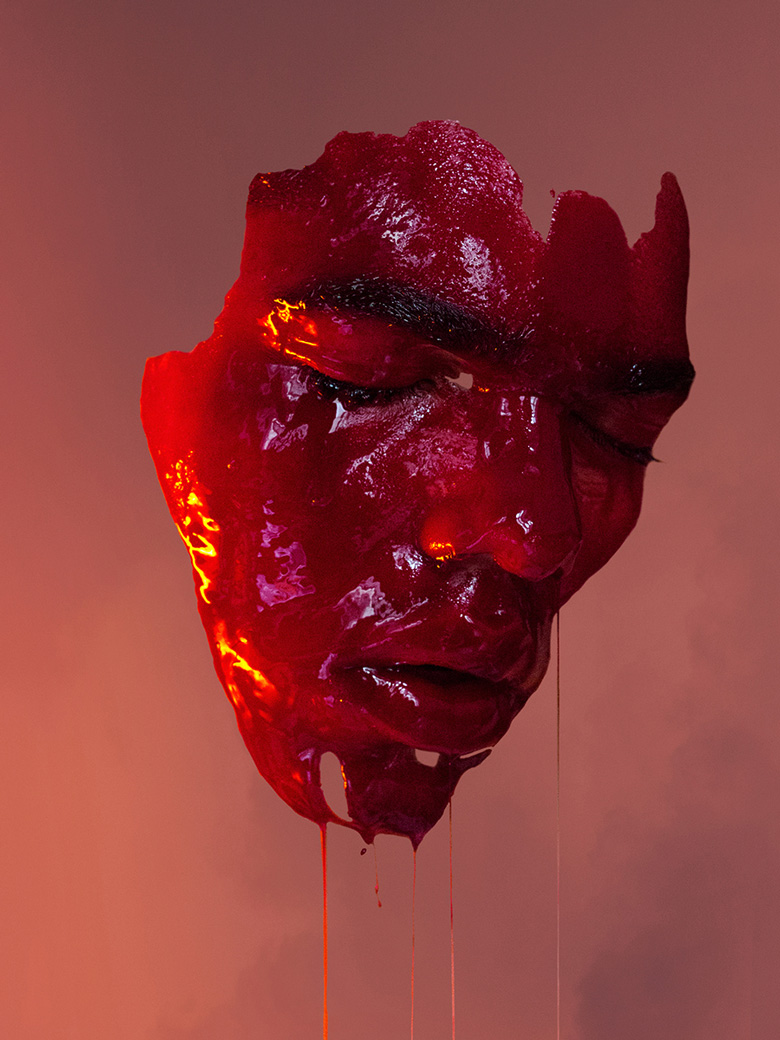
Bindi Vora: Thinking about these issues in relation to your Austrian-Nigerian heritage, you were born in Austria but throughout your formative years you moved to multiple countries across Europe. These experiences must have had an influence on your practice.
David Uzochukwu: I have an interest in placelessness; with so much movement each location felt impossible to geographically locate. It’s how I felt growing up, missing the strangest things about past homes, but it didn’t matter so much where I was. My family was around, I held my friends close to my heart, and life moves on. Being somewhat unrooted made the idea of long-distance friendships feel only natural. An online community of photographers became a constant source of inspiration throughout my teenage years, but for me to make a living off photography seemed unimaginable! It was an interesting change to get to know others through their work, then to be known and seen through mine. That connection showed me there were likeminded people out there.
Bindi Vora: Some of the first works you made were a series of self-portraits A Familiar Ruin (2016). In these photographs you coated yourself in a tar-like material, this impenetrable substance on your skin, and then placed yourself in familiar settings such as a bath, on a bed, in an overcrowded bus. You’ve previously spoken about reclamation of space, do you think centring yourself in these images helps to do this, or is it about a universality?
David Uzochukwu: With self-portraiture, I have my skin in the game, there’s one less layer of projection. It shifts the ways myself - and others - can see my selves. It feels honest, and the least entangled with photography’s violent potentials. A Familiar Ruin stems from a period of absolute fear and rage, realising how feeling othered existentially shaped my character. My thoughts, feelings, actions, all circled around the incapability of making or admitting mistakes, trying to give opposition the least amount of grip possible. I loved the contrast between the cold, painful performance creating these photographs, and the surroundings that are not particularly notable, just the settings for my everyday routines. I didn’t want to make anything too abstract, I aimed to visibly collapse this inner struggle into a slick second skin. While it burned in my eyes, it was beautiful in its starkness, and in the way it caught the light in the images.
To me, engaging in self-portraiture is about hoping that a very intimate process can achieve emotional universality. I think about reclaiming space on the most personal scale imaginable: a loving gaze, more kindness towards myself, futures with us in it.
Bindi Vora: What are you working on now?
David Uzochukwu: I'm still trying to exhibit Mare Monstrum / Drown In My Magic somewhere, as soon as the current Covid-19 wave eases up. Despite not knowing how it will happen, it’s really exciting to think about how I would present the work in a physical space. I’m also developing a short docufiction that reevaluates my gaze on my father, and a more casual photographic self-portrait series.
Can you spare a few moments? Autograph is carrying out a survey to better understand who our digital audiences are. The survey should take no longer than five minutes to complete. Anything you tell us will be kept confidential, is anonymous and will only be used for research purposes.
The information you provide will be held by Autograph and The Audience Agency, who are running the survey on our behalf. In compliance with GDPR, your data will be stored securely and will only be used for the purposes it was given.
You can take the survey here. Thank you!
Images in this article © David Uzochukwu, courtesy of the artist and Galerie Number 8.
Autograph is a space to see things differently. Since 1988, we have championed photography that explores issues of race, identity, representation, human rights and social justice, sharing how photographs reflect lived experiences and shape our understanding of ourselves and others.